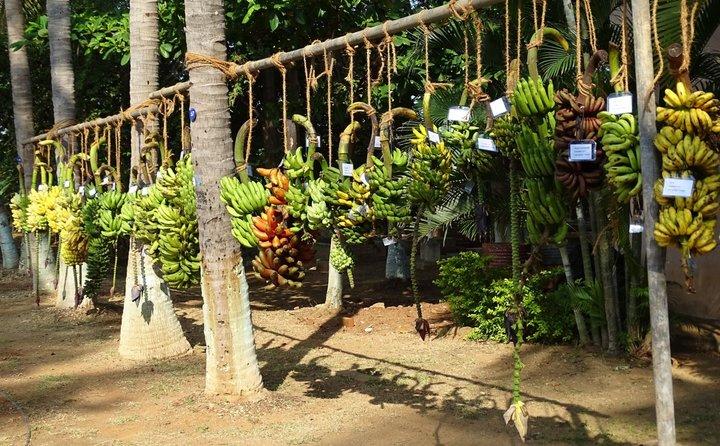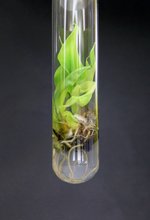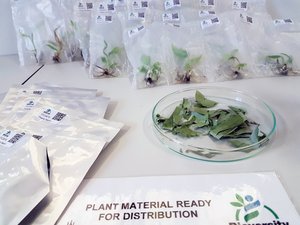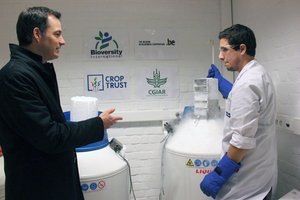Celebrating banana diversity – A treasure chest hosted in Belgium

Last week, Director General M. Ann Tutwiler celebrated, together with national and international partners, the 30th anniversary of the world’s largest banana genebank, the Bioversity International Musa Germplasm Transit Centre, hosted in Belgium.
Last week, Director General M. Ann Tutwiler celebrated, together with national and international partners, the 30th anniversary of the world’s largest banana genebank, the Bioversity International Musa Germplasm Transit Centre, hosted in Belgium. The collection maintains 1,500 samples representing hundreds of banana varieties, which are distributed to farmers and scientists all over the world to make banana farming more productive, resilient and sustainable.
Belgium’s relationship with the banana goes deep. Did you know, for example, that it is the second largest exporter of bananas in the world? That’s because it is also the second largest importer of bananas. An even bigger surprise to many people will be that bananas flourish in Belgium. Not in the wild, but in the carefully controlled conditions of the Bioversity International Musa Germplasm Transit Centre, known as the ITC. The bananas there are conserved in vitro; that is, as mini-plants in test tubes. An increasing number of bananas are also cryopreserved, frozen in liquid nitrogen at -196°C, which allows them to be conserved for thousands of years.
 The ITC, a 30-year old partnership between Bioversity International and Katholieke Universiteit Leuven (KU Leuven), houses the world’s largest collection of bananas, with more than 1,500 samples representing hundreds of banana varieties.
The ITC, a 30-year old partnership between Bioversity International and Katholieke Universiteit Leuven (KU Leuven), houses the world’s largest collection of bananas, with more than 1,500 samples representing hundreds of banana varieties.
While Belgium exports bananas for Europe to snack on, one of the most important jobs of the ITC is to send banana plants to researchers and developing country farmers around the world.
Celebrating banana conservation
All this, and more, came to light recently during a celebration of 30 years of banana diversity hosted in Belgium – A treasure chest to feed the world, which I was honoured to open. The event brought together our research partners in Belgium and countries where bananas are an important staple food, along with supporters like the Crop Trust, CGIAR and donors, including Belgium’s Deputy Prime Minister and Minister for Development Cooperation, Alexander De Croo.
Mr De Croo told us all how impressed he was with the work being done by Bioversity International and KU Leuven at the ITC. "The Belgian Development Cooperation has been supporting the genebank for decades and I look forward to continuing this successful collaboration,” he said.
 The Minister is well aware of the global importance of the banana. People in western, temperate countries generally see it only as a tasty snack, the most popular fruit in the world. In the tropics, however, the banana is far more. People in Uganda, for example, consume 300 kilograms of bananas a year. For them, and for many other people around the world, bananas are a staple food providing most of their daily calories. Because bananas are generally local and inexpensive, they underpin food security and livelihoods for millions of people. They could, however, provide even more.
The Minister is well aware of the global importance of the banana. People in western, temperate countries generally see it only as a tasty snack, the most popular fruit in the world. In the tropics, however, the banana is far more. People in Uganda, for example, consume 300 kilograms of bananas a year. For them, and for many other people around the world, bananas are a staple food providing most of their daily calories. Because bananas are generally local and inexpensive, they underpin food security and livelihoods for millions of people. They could, however, provide even more.
Bananas for better nutrition
They could, for example, help the 500 million children each year who suffer vitamin A deficiency and possible blindness. In parts of the Pacific there are bananas the colour of bright orange carrots, and for the same reason; they contain large amounts of carotene pigments, precursors that the body needs to make vitamin A. Less than one banana a day of these varieties could give a child under 5 all the vitamin A they need.
Starting years ago, working with the ITC, scientists at Bioversity International began searching for varieties that contain above-average amounts of vitamin A precursors. At the ITC’s anniversary event, Bioversity International scientists told us how they had identified several promising types and shared them with farmers in East Africa. Some of them performed well in the field and people liked some of these new varieties as much as the ones they were familiar with, when eaten fresh (for dessert) or boiled, roasted or pan-fried (for plantains and other cooking banana varieties).
This is encouraging news, so we are now expanding the project to 1,500 women and men farmers in four countries. If the results continue to be good, which I confidently expect they will, we hope to extend these life-saving, nutritious bananas to reach one million farmers and their 5 million dependents by 2020.
Keeping the collection healthy
 The ITC plays a crucial role in this research in two ways. First, as guardian of the world’s largest collection of different kinds of bananas, it was an obvious place to look for varieties blessed with high levels of vitamin A precursors. Secondly, the ITC has the skills and technology to produce test plants that can be guaranteed free of diseases. This is crucial to allow us to distribute varieties to different countries for trials. Carotene-rich bananas from the Pacific came first to the ITC in Belgium, where they are being conserved and multiplied to provide African smallholders with the varieties they need to improve their health and well-being.
The ITC plays a crucial role in this research in two ways. First, as guardian of the world’s largest collection of different kinds of bananas, it was an obvious place to look for varieties blessed with high levels of vitamin A precursors. Secondly, the ITC has the skills and technology to produce test plants that can be guaranteed free of diseases. This is crucial to allow us to distribute varieties to different countries for trials. Carotene-rich bananas from the Pacific came first to the ITC in Belgium, where they are being conserved and multiplied to provide African smallholders with the varieties they need to improve their health and well-being.
Bananas are highly susceptible to viruses and bacteria. Being the way station for the safe movement of research banana plants around the world, is an important function for the ITC. Working with its partners in Belgium and abroad, the Centre researches the bacteria and viruses that can lurk within banana plants in order to be able to detect and eliminate them, so that plants can be sent out with a clean bill of health.
Nutrition is not the only area in which the banana collection at ITC is making a vital contribution. Researchers are also looking for varieties that may be more drought tolerant, to cope with climate change, and seeking resistance to a new, virulent strain of the fungus called Panama disease, which is spreading and that threatens banana plantations worldwide. Solutions to these and other challenges that face banana growers around the world are likely to be found among the treasures in the ITC collection.
 This treasured collection of bananas needs to be kept safe. In addition to maintaining mini-plants in test tubes, the ITC is also a leader in cryopreservation, which can conserve plant material indefinitely. Cryopreservation is important for crops like bananas, potatoes, cassava, taro and others that do not produce seeds or their seeds cannot be stored in the same way as maize, wheat and rice. Bioversity International and KU Leuven have pioneered research into the protocols that enable many different kinds of plants to be frozen in liquid nitrogen and thawed to produce healthy new plants. Cryopreservation holds great potential as a way to conserve forever those crops that do not produce storable seeds, to protect global food security.
This treasured collection of bananas needs to be kept safe. In addition to maintaining mini-plants in test tubes, the ITC is also a leader in cryopreservation, which can conserve plant material indefinitely. Cryopreservation is important for crops like bananas, potatoes, cassava, taro and others that do not produce seeds or their seeds cannot be stored in the same way as maize, wheat and rice. Bioversity International and KU Leuven have pioneered research into the protocols that enable many different kinds of plants to be frozen in liquid nitrogen and thawed to produce healthy new plants. Cryopreservation holds great potential as a way to conserve forever those crops that do not produce storable seeds, to protect global food security.
Ann Tutwiler
___________________
The Bioversity International Musa Germplasm Transit Centre is supported by: the CGIAR Research Program for Managing and Sustaining Crop Collections; the CGIAR Research Program on Roots, Tubers and Bananas; CGIAR Fund Donors; the Crop Trust; BMZ - Federal Ministry for Economic Cooperation and Development; The Belgian Development Cooperation; The Katholieke Universiteit Leuven.
Photos (from top to bottom):
1. Banana diversity. Credit: Bioversity International/J.Sardos
2. In vitro banana conserved at the ITC. Credit: Bioversity International/N.Capozio
3. Belgium Deputy Prime Minister and Minister for Development Cooperation, Alexander De Croo, speaking at the ITC 30 anniversary event. Credit: Bioversity International/N.Capozio
4. Plant material ready for distribution to users all over the world. Credit: Bioversity International/N.Capozio
5. Belgium Deputy Prime Minister and Minister for Development Cooperation, Alexander De Croo, visiting the cryopreservation facilities at the ITC. Credit: Bioversity International/N.Capozio
